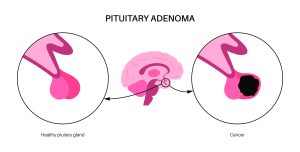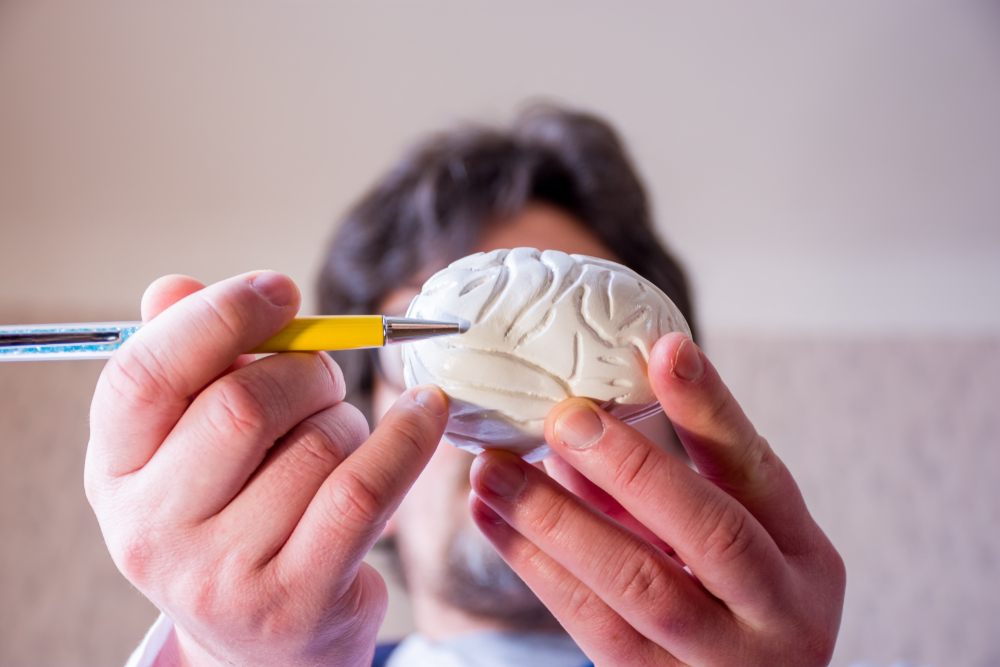Welcome to the Adenoma Treatment Clinic at Emirates Hospitals Group, where we specialize in diagnosing and treating adenomas, a type of benign tumor that can occur in various glands and organs such as the thyroid, pituitary, adrenal glands, and colon. Our team of experienced specialists, including endocrinologists, surgeons, and oncologists, are dedicated to providing comprehensive care and advanced treatment options to manage and remove adenomas, improving your quality of life.
With cutting-edge technology and a personalized approach, we ensure you receive the highest standard of care tailored to your specific needs.
What is an Adenoma?
An adenoma is a benign (non-cancerous) tumor that develops in the glandular tissues of various organs in the body. Adenomas can occur in the thyroid, pituitary gland, adrenal glands, colon, and other organs, and although they are typically non-cancerous, they can cause symptoms by affecting hormone production or organ function.
Adenomas can vary in size and may grow slowly over time. In some cases, they may cause health problems due to their location or the excess production of hormones. While most adenomas are benign, some may develop into malignant tumors over time, which is why early detection and treatment are crucial.
What is a Brain Adenoma?
A brain adenoma is a benign tumor that forms in the glandular tissue of the brain, commonly affecting the pituitary gland or hypothalamus. These adenomas can cause a range of symptoms, especially if they affect hormone production or grow large enough to exert pressure on surrounding structures, such as the optic nerves or other parts of the brain.
Although brain adenomas are typically non-cancerous, they can lead to significant health issues, including hormonal imbalances, vision problems, and neurological symptoms. They are often slow-growing, and many patients may not experience symptoms immediately.

Adenoma Treatments in Dubai
At the Adenoma Treatment Clinic, we offer a variety of treatment options depending on the type, size, and location of the adenoma. Our goal is to provide effective and personalized treatments to ensure the best possible outcomes for each patient. Some of the key treatment options we offer include:
- Adenoma Surgical Removal: Surgery is often the preferred treatment for adenomas, especially if the tumor is causing symptoms or affecting organ function. Our skilled surgeons perform minimally invasive and open surgical procedures to remove the adenoma safely and effectively.
- Medications: For certain types of adenomas, medications may be used to regulate hormone production and manage symptoms. Medications are typically used for pituitary or adrenal adenomas that cause hormonal imbalances.
- Radiation Therapy: In some cases, radiation therapy may be recommended, especially if the adenoma is not amenable to surgery or is causing persistent symptoms. This is particularly common for pituitary adenomas.
- Observation: If the adenoma is small, asymptomatic, and not affecting organ function, a “watch and wait” approach may be recommended. Regular monitoring with imaging tests, such as CT scans or MRIs, will be performed to ensure the adenoma is not growing or causing any issues.

Symptoms of Brain Adenomas
Symptoms of a brain adenoma depend on the tumor’s size, location, and whether it produces hormones. Common symptoms include:
- Headaches: Persistent or severe headaches that worsen over time.
- Vision Problems: Blurred or double vision, or loss of peripheral vision, especially if the tumor presses on the optic nerves.
- Hormonal Imbalances: Symptoms related to excess hormone production, such as weight gain, sweating, or changes in menstruation (for women), or excessive thirst and urination.
- Fatigue or Weakness: Generalized fatigue, weakness, or a lack of energy, often related to pituitary adenomas affecting hormone levels.
- Nausea and Vomiting: Occurs in some cases due to increased pressure in the brain.
- Cognitive or Behavioral Changes: Difficulty concentrating, memory problems, or personality changes, particularly with larger tumors.
Diagnostic Approaches for Adenomas
Accurate diagnosis is crucial for determining the most appropriate treatment plan. At Emirates Hospitals Group, we use advanced diagnostic tools to assess the size, location, and type of adenoma:
- MRI (Magnetic Resonance Imaging): The most common and detailed imaging method to visualize the tumor in the brain and surrounding structures.
- CT Scan (Computed Tomography): A CT scan may be used for initial evaluation or if MRI is not available.
- Blood Tests: Hormonal blood tests help determine if the adenoma is affecting hormone levels, particularly in the case of pituitary adenomas.
- Endocrine Tests: These tests assess the function of the pituitary gland and its hormone production to help diagnose adenomas that cause hormonal imbalances.

Recovery and Post-Treatment Care for Adenoma Surgery in Dubai
Recovery time after adenoma treatment varies depending on the type of treatment and the location of the adenoma. At Emirates Hospitals Group, we provide comprehensive post-treatment care to ensure a smooth recovery and optimal outcomes:
- Hospital Stay: Depending on the procedure, patients may need to stay in the hospital for 1 to 3 days after surgery. Minimally invasive surgery may require a shorter hospital stay.
- Medication Management: After surgery or radiation therapy, you may be prescribed medications to manage symptoms, regulate hormone levels, or prevent complications. Regular follow-up visits will be scheduled to monitor progress and adjust medications as needed.
- Rehabilitation: Some patients may require rehabilitation or therapy, particularly if the adenoma affects cognitive function or physical abilities. This is more common after pituitary surgery or adrenal surgery.
- Follow-Up Appointments: Regular follow-up visits are essential to monitor recovery, check for recurrence, and ensure that any hormonal imbalances are addressed. Imaging tests may be scheduled periodically to track the adenoma’s size and activity.
- Lifestyle Adjustments: Lifestyle changes such as a healthy diet, regular exercise, and stress management may be recommended to support overall health and recovery.


